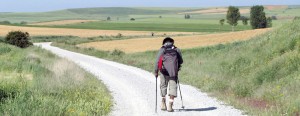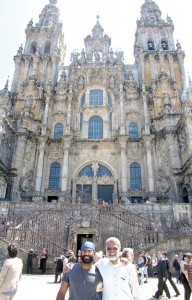Long walk to camaraderie
View(s):The simple pleasures of life had passed him by for far too long. A practising family physician based in Melbourne, Dr. Sanjiva Wijesinha is a busy man. When his son Shivantha gifted him with Paulo Coelho’s ‘The Pilgrim’ for a birthday Wijesinha found himself reading with great curiosity the author’s account of walking the El Camino de Santiago (The Way of Saint James). An 800 km stretch through Spanish villages, lush green fields and historic towns, the Camino is a tour de force of physical endurance undertaken by thousands of pilgrims every year. Some for religious reasons-the remains of Saint James the Apostle are said to be buried at the location where the pilgrimage ends, in Santiago-and others simply for the pleasure of physical activity, or the space for reflection the long walk affords.
 Curiosity piqued, Wijesinha would find that once you discovered the Camino it simply wouldn’t go away. “I’d see it everywhere,” he laughs. From books to magazines and even on television, the Camino was ever present and with the passing of a close friend Wijesinha decided that it was time to take a much needed break from his heavy schedule. He rang Shivantha with the suggestion-“he said yes right away.”
Curiosity piqued, Wijesinha would find that once you discovered the Camino it simply wouldn’t go away. “I’d see it everywhere,” he laughs. From books to magazines and even on television, the Camino was ever present and with the passing of a close friend Wijesinha decided that it was time to take a much needed break from his heavy schedule. He rang Shivantha with the suggestion-“he said yes right away.”
Shivantha, a lawyer, actor and musician based in New York, had not seen his father for almost ten months and didn’t have to think too long about taking on the pilgrimage. Later, he says he’s glad he did. The Camino brought father and son closer together-the experiences we they shared and the many memories and friends made along the way will make for great stories one day.
The duo met in France just a few days after the April New Year celebrations (“perfect timing-not too hot, not too cold”); Shivantha, having wrapped up his work and other obligations back in New York and Dr. Wijesinha happily on his sabbatical. Having rested for a few days, they set off to catch the train that would take them to Bayonne. From here they travelled to St. Jean Pied de Port, where they began their Camino journey through the Route Napoleon (the route taken by Napoleon on his return from Elba in 1815). There are many ways to travel the Camino; pilgrims have been making the trek since the 11th century-perhaps even earlier.

Journey’s end: Father and son in front of Santiago Cathedral
How on earth does one take on an 800 km walk without feeling the slightest bit of trepidation? The Camino trail is approximately almost 300 km in excess of the distance between Dondra Head and Point Pedro in Sri Lanka, just for a measure of the distance. You prepare, and you prepare well, say the Wijesinhas. Firstly, the rule of thumb for all serious travellers-travel light and travel smart. About 100 kilometres into the journey Dr. Wijesinha found himself packing up things he really didn’t need and posting them back home. After another few hundred kilometres, so did his son. “You start shedding layers,” says Shivantha. “You really strip things down to the bare essentials.” Never wear new trainers-break them in or you’ll have painful blisters over the first week. And of course, prepare yourself both mentally and physically for the long and taxing journey you’re about to undertake, says Dr. Wijesinha. “It’s by no means an easy task, walking that distance.”
Along the way father and son made many friends; Roland, with his donkey Praline, and Fadi, a Lebanese social worker. There was recently divorced Canadian Greg, mother and daughter Leonie and Claire…they all became fast friends over the duration of the trip. “We would keep bumping into them,” smiles Shivantha. Over many shared early breakfasts, lazy Spanish lunches and hearty, wine-fuelled dinners, the travellers would swap their stories and offer each other advice. Together, father and son were conversant in a fair number of languages-Wijesinha had signed himself up for Spanish a few months prior to leaving and Shivantha spoke French and Italian quite fluently. At the dinner table the father would translate the waiting staff’s Spanish, and Shivantha would translate the others’ conversation for his father. “And when we wanted to share a word in private, we just switched to Sinhalese,” Shivantha winks. “It all worked out well in the end.”
Finding accommodation over the trip’s duration was quite easy, they tell us. Pilgrims have been walking the Camino for over a thousand years and somewhere along the way, the Spanish copped on to the profits to be made from this pilgrim business. Plenty of albergues (small rest houses) line the Camino trail so in the evening it was a matter of finding a fairly respectable place and getting some shut eye….except for that one time, when every albergue in the vicinity was booked out. In the end, father and son found an old warehouse owner willing to let them stay overnight in his building. “It was just us, and this massive, empty warehouse.” Over the trip they learnt to share rooms and spaces when finding individual accommodation proved to be futile. “You lose your sense of privacy,” says Dr. Wijesinha. “It’s so easy to share deeply personal things with people you have never met before, especially when you’re all in the same boat.”
For instance they met several travellers who were walking the Camino following great turmoil in their lives. Roland had lost a son to cancer, and another had lost his father. “We realized that there were people here who had been through a great deal,” shares Shivantha. “It changed our perspective of life-you learn to identify what’s really important.”
Walking through historic Spanish towns was an interesting experience, they say. Spain is a deeply Catholic country with strong roots in religion. “As a non-Catholic I could look at certain things with an open eye,” says Dr. Wijesinha. In his book he describes in great detail the stunning architecture and art of the Spanish churches and the kindness of their administrators. He expresses great admiration for the men who dedicated their lives to building these works of art; “can you imagine, spending your entire life building something you know you might never see completed in your own lifetime?” He also, objectively, discusses organized religion’s excessive focus on the gravely symbolic, in abundant display throughout Spanish churches. Over the duration of the trip both father and son encountered several men and women of different denominations and this only reinforced their respect for varied faiths and beliefs in today’s world. Arriving at their final destination and gazing upon the cathedral that was said to house the remains of Saint James was not exactly a moment of great revelation, says father and son, but it certainly made its mark.
“I just looked at my dad, and said ‘Thaththi I have never told you this before, but I love you very much,” says Shivantha. Growing up, the Wijesinhas had the same relationship with their father that most boys do. And that meant ‘I love you’s rarely made an appearance in conversation. “I struggled to say something for a few seconds,” says the older Wijesinha. “I know my father loves us, but I don’t think he ever said those exact words to me or my siblings.” Chuckling, he quotes a line from Harry Potter- which he used to read to his daughter before bedtime (this is a very cool doctor indeed)-where Hermione tells Ron that men have the emotional range and capacity of a teaspoon. “In the end, I just settled for a hug!”
And for both father and son, this is the greatest gift the Camino has blessed them with. They shared a great relationship before, but say this trip has given that relationship an easy camaraderie and fellowship that only a great deal of time spent together can allow. “It is gratifying to realise that it is not just the colour of his hair and the shape of his nose that he has inherited from me,” writes Dr. Wijesinha of his son in the book. “But also many of the values that I cherish.”
One cannot help but feel that the other man in this brotherhood, the distinguished former Secretary General of Parliament and Ombudsman Sam Wijesinha, father of Dr. Sanjiva and grandfather of Shivantha feels the same way. “We all live in the shadows of our fathers,” Dr. Wijesinha has told us. Yet before the interview, we had sat with the oldest Wijesinha for a while. “Have you read my son’s book?” he asks.
“It’s a great read.” And that it is; Dr. Wijesinha has a deft touch with words, made all the more enjoyable for he makes no pretence of literary eloquence in his writing. This is reading for pleasure, where the words serve to paint vivid imagery of their time on the Camino, and the engaging, highly evocative storytelling only makes you want to take the trip yourself. There’s much to learn on the Camino, after all.
Dr. Wijesinha’s book ‘Strangers on the Camino- A Father, a Son and a Holy Trail’ , a Vijitha Yapa publication is now available at leading bookshops priced at Rs. 750.


